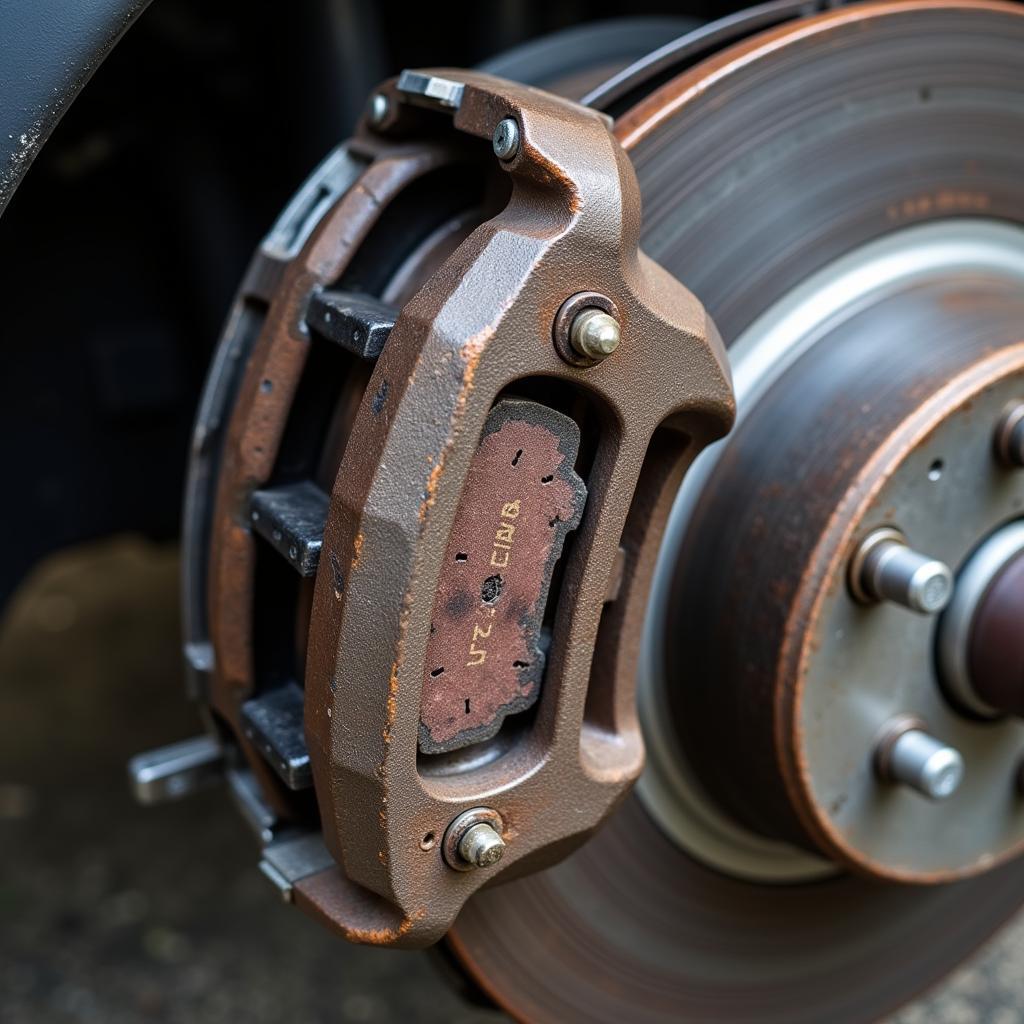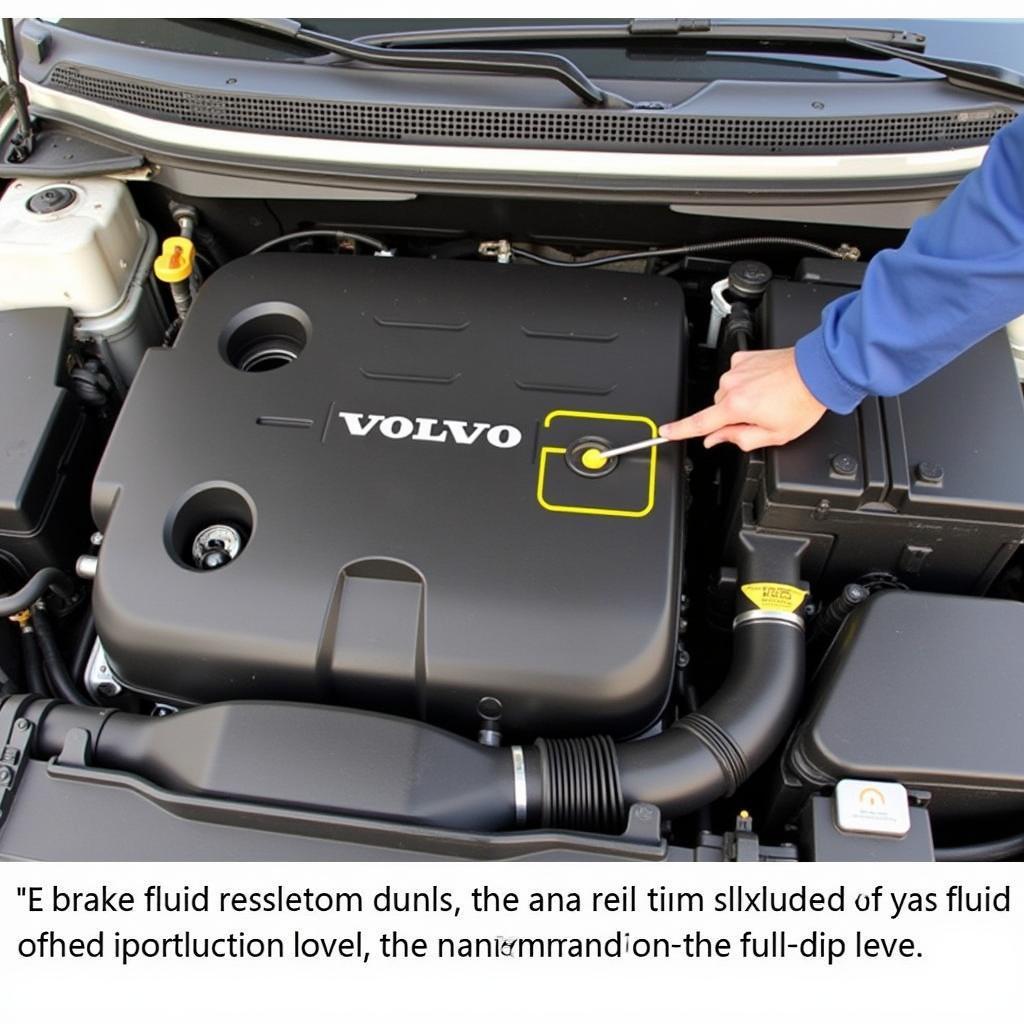A glowing brake warning light on your Range Rover’s dashboard is a clear sign that something isn’t right. Ignoring it could jeopardize your safety and lead to costly repairs. This comprehensive guide will explore the common causes of the Range Rover brake warning light and offer practical solutions for a quick resolution.
Deciphering the Warning: Why is My Brake Light On?
While the brake warning light primarily indicates a problem with your braking system, several factors can trigger it:
- Worn Brake Pads: The most common culprit. Your Range Rover is equipped with brake pad wear sensors that trigger the warning light when the pads reach a certain level of wear.
- Low Brake Fluid Level: Brake fluid is crucial for transmitting force to the brake calipers. A leak in the system can lead to a drop in fluid level, triggering the warning light.
- Faulty Brake Sensor: Like any electrical component, brake sensors can malfunction. A faulty sensor might send incorrect signals, illuminating the warning light even when the brakes are functioning correctly.
- ABS Issue: While a separate warning light usually accompanies Anti-lock Braking System (ABS) issues, a general brake warning light might also illuminate. This could signify a problem with the ABS control module, wheel speed sensors, or the hydraulic unit.
- Parking Brake Engaged: Sometimes, the simplest explanation is the most likely. If the parking brake is even slightly engaged, it can trigger the warning light.
Diagnosing the Problem: Steps to Take
Determining the root cause of the brake warning light requires a systematic approach:
- Check the Parking Brake: Ensure the parking brake is fully disengaged. Sometimes, a slight bump can partially engage it.
- Inspect Brake Fluid Level: Locate the brake fluid reservoir under the hood and check the fluid level. If it’s below the minimum mark, there might be a leak.
- Examine Brake Pads: Visually inspect the brake pads through the wheel spokes. Look for significant wear or if the pad material is close to the metal backing plate.
- Consult a Professional: If the parking brake and brake fluid level seem fine and the brake pads appear to have sufficient life left, it’s best to consult a qualified technician.
Range Rover Brake Warning Light: Model-Specific Considerations
While the general causes mentioned above apply to all Range Rover models, some model-specific issues might exist:
- Range Rover Sport: Some Range Rover Sport owners have reported issues with the Electronic Parking Brake (EPB) module, causing the brake warning light to illuminate.
- Range Rover Evoque: Software glitches in the Evoque’s electronic systems have been known to trigger false brake warning lights.
- Range Rover P38: The older P38 models might experience issues with the ABS accumulator, leading to brake warning lights and a spongy brake pedal feel.
 Worn brake pads on a Range Rover
Worn brake pads on a Range Rover
Remote Diagnostics and Software Solutions: The Future of Repair
Advancements in automotive technology have paved the way for remote diagnostics and software solutions for certain brake warning light issues. Qualified technicians can remotely access your Range Rover’s onboard computer system to:
- Read Fault Codes: Identify the specific fault codes triggering the warning light.
- Analyze Sensor Data: Evaluate data from various sensors to determine the root cause of the problem.
- Perform Software Updates: Install software updates to rectify software glitches that might be causing false warnings.
- Recalibrate Systems: After repairs, recalibrate electronic systems like the Electronic Parking Brake (EPB) or ABS.
However, it’s important to note that not all issues can be resolved remotely. Physical repairs, such as replacing worn brake pads or fixing fluid leaks, still require hands-on intervention.
range rover p38 brake warning light
Addressing the Warning Light: A Word of Caution
Ignoring the brake warning light can have serious consequences. Driving with compromised brakes puts your safety and the safety of others at risk. Moreover, delaying repairs can exacerbate the problem and lead to more extensive and expensive repairs down the line.
“Addressing brake issues promptly is paramount,” says Mark Stevenson, a senior automotive technician with over 20 years of experience specializing in European vehicles. “Ignoring a brake warning light is like ignoring a ticking time bomb. It’s not a matter of if it will go off, but when.”
Frequently Asked Questions:
Q: Can I drive my Range Rover with the brake warning light on?
A: It’s strongly advised against driving with the brake warning light illuminated. It indicates a potential problem with your braking system, jeopardizing your safety.
Q: How much does it cost to fix a Range Rover brake warning light issue?
A: The cost of repair varies depending on the underlying cause. A simple brake pad replacement is less expensive than fixing a faulty ABS module.
brake pad warning light on range rover sport
Q: How often should I check my Range Rover’s brake fluid level?
A: It’s a good practice to check your brake fluid level at least once a month and top it up if necessary.
Q: Can I add any brake fluid to my Range Rover?
A: No, use only the brake fluid type specified in your Range Rover’s owner’s manual. Using the incorrect fluid can damage the braking system.
Q: What should I do if my Range Rover’s brake warning light comes on while driving?
A: If safe, pull over to the side of the road and assess the situation. Check the parking brake, and if it’s released and the brake fluid level appears normal, contact a qualified technician.
Maintaining Your Range Rover Brakes: Essential Tips
Proactive maintenance is crucial for preventing brake-related issues:
- Regular Brake Inspections: Get your brakes inspected by a qualified technician at least once a year or as recommended in your owner’s manual.
- Timely Brake Pad Replacement: Don’t wait for the brake warning light to illuminate before replacing worn brake pads. Follow the recommended replacement intervals.
- Quality Brake Fluid: Use high-quality brake fluid that meets the specifications outlined in your Range Rover’s owner’s manual.
- Address Leaks Promptly: If you notice a drop in brake fluid level or suspect a leak, have it addressed by a professional immediately.
range rover sport brake pad warning light
Conclusion
The brake warning light on your Range Rover is not a signal to ignore. By understanding its various triggers and adopting a proactive approach to diagnosis and maintenance, you can ensure optimal braking performance and, most importantly, your safety on the road. When in doubt, consult a qualified technician specializing in Range Rover vehicles to diagnose and resolve any brake-related issues.

